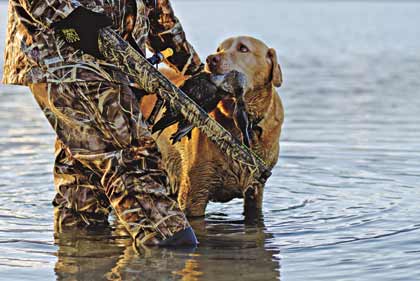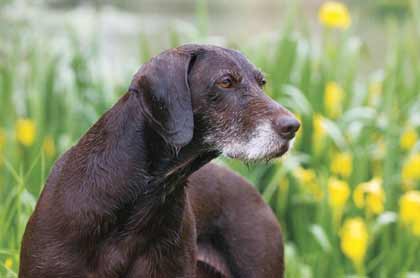Thinking of working an older dog? Here's what you need to know.
By Bob West
There is no way around it; linked to the phenomenon of "time flying" is our dog's age, so eventually we're all going to be faced with caring for and working with older dogs. But just because our dog is showing signs of age doesn't mean his hunting days are over. With special attention there still can be some good, productive seasons ahead.
Furthermore, the special attention I mention is really nothing new or different, only a renewed awareness and sensitivity to the normal concerns relating to health care, feeding, exercise and training of any hunting dog. So let's see how we might help the old duffer through another season or two.
What's old?
The term "geriatric" used to identify individuals who require special, age-related care has somewhat ambiguous parameters, because of so many contributing factors.
The saying, "You're as old as you feel," pretty well holds true with dogs.
One dog might be termed geriatric at five years while a littermate may not until eight years or older, depending on the individual. Years alone don't determine this status; genetics and environment, along with past health care, work, stress, injuries and many other factors contribute to one's being classed as geriatric.
Having said that, there are charts that bracket when we might expect old Bowser to start his slide based on size and age: medium dogs (21 to 50 lb): nine to 11 years, and large dogs (51 to 90 lb): seven to 10 years. I'm sure these averages were gathered from the general population, but they should hold pretty true for gun dogs, as well. To give you a rough idea, at present the general dog population is estimated at over 51 million, and studies also show nearly one-third of these dogs are over 10 years old. This means that, statistically speaking and based on age, there are over 15 million crotchety old codgers grumbling around kennels and homes across the country€¦maybe a good day of hunting is just what they need to get 'em back on track!
Proper care
Sooner or later we're all going to be depending on older dogs to some extent. We hope we've taken good care of our dogs throughout their lives--not only health care, but also by providing proper exercise, housing, and nutrition. If this is the case, we've assured ourselves of top performance in the short term while also better positioning our dog for a healthier and longer life.
Studies at Nestle Purina PetCare have concluded that dogs keep in correct body condition throughout their lives live on average 1.8 years longer and during their life are far healthier day to day compared to peers who are overweight.
But now we're closing in on hunting season, so what can we do?
€¢ Start with a trip to your veterinarian. Ask that your dog be checked over thoroughly, and be sure to let your vet know you are planning on beginning an exercise program and later actually hunting your dog. Your vet will give your dog a good going over, alert you to findings, and provide a general opinion of your dog's condition, in addition to bringing vaccinations and parasite control up to date.
 A gray muzzle doesn't mean he can't deliver the goods if given the chance. |
€¢ Get started on a good, complete and balanced dog food, formulated for hardworking dogs. Feed your dog to maintain optimal body condition (not too heavy or too thin). The amount necessary to achieve this goal will vary based on the individual, the activity and the weather, not age. So remember, even if you're using a good product, as activity increases and colder weather comes along you have to feed a little more each day to keep the available energy level and calories up there.
€¢ Begin an exercise program. At first, walk a little each evening, then progress to extended runs in field areas. Do some water work, as it's great for exercise, especially during hot weather. Use your head but continue to make the work harder and go for longer times to build the dog's stamina and overall "toughness."
€¢ Brief yourself on signs of fatigue and stress, remembering that with older dogs you have to be especially alert. Desire or prey drive doesn't fade with age so in a sense we have to protect the old ones from themselves. The earlier you can spot problems and force the dog to take it easy or stop and rest, the better off you are. Stay alert, watch tail action and body animation, use common sense, and you'll be okay.
€¢ Alternate time on the ground with other dogs. Older dogs need a good deal of rest, so break it up, hunt with a friend and alternate with his dogs or others of your own. If you just have the one, pace yourself and base your activity on that individual's ability.
€¢ While traveling pay special attention to the old dogs. Be sure they're provided dry, draft free compartments with good padding so they travel comfortably and are well rested. Also, stop often--veterinarians and other health care folks say dogs should be allowed some exercise and an opportunity to relieve themselves every hour or so; others recommend we stop at least every two hours.
€¢ Keep a good supply of fresh clean water available at all times. At home and in the kennel allow free access to water; while in the field always carry a container of fresh water with you so you can give the old duffer a little shot every ten minutes or so.
€¢ After hunting, check your dog over thoroughly for burrs, weed seeds and stickers, especially in long-coated breeds. Older dogs often don't do a very good job of cleaning themselves and burrs can irritate or even break the skin, allowing for infection and further complications.
€¢ When you arrive in a new area that you plan to hunt, take the time to find a veterinarian's office and jot down the phone numbers for daytime and emergencies. You hope you won't have to use them but if you do the time saved will be worthwhile.
€¢ Older dogs retrieving ducks from cold water should have a place to get in out of the wind between retrieves. Having an old blanket or one of the new neoprene vests is a good idea.
€¢ Old dogs can be aggravated or even injured by young or overzealous and playful pups, so this has to be a consideration when matching bracemates.
 |
€¢ If your dog tends to get stiff or sore after a day in the field you may also want to talk to your veterinarian about using supplements or medications that may help deal with this problem. Something as simple as adding some fish oil capsules or in more severe cases giving a mild anti-inflammatory like Rimadyl may really help turn back the hands of time and help him better enjoy your days in the field.
As I said at the beginning, when working older dogs we're faced with the same concerns as hunting with younger ones, but we do have to be far more alert and considerate of their needs.
Looking back, it is easy to see the importance of proper health care, exercise and nutrition to our hunting companion's longevity--simply put, with proper care, exercise, and nutrition our dogs cannot only work longer each day; they can live longer, healthier and more productive lives.
As you head for the field this fall, take your time and enjoy each day with your old friend. Remember, the old ones know very well why they're out there and usually are masters at finding and handling birds. It's possible the most gratifying, memorable hunt of your life is yet to come!






